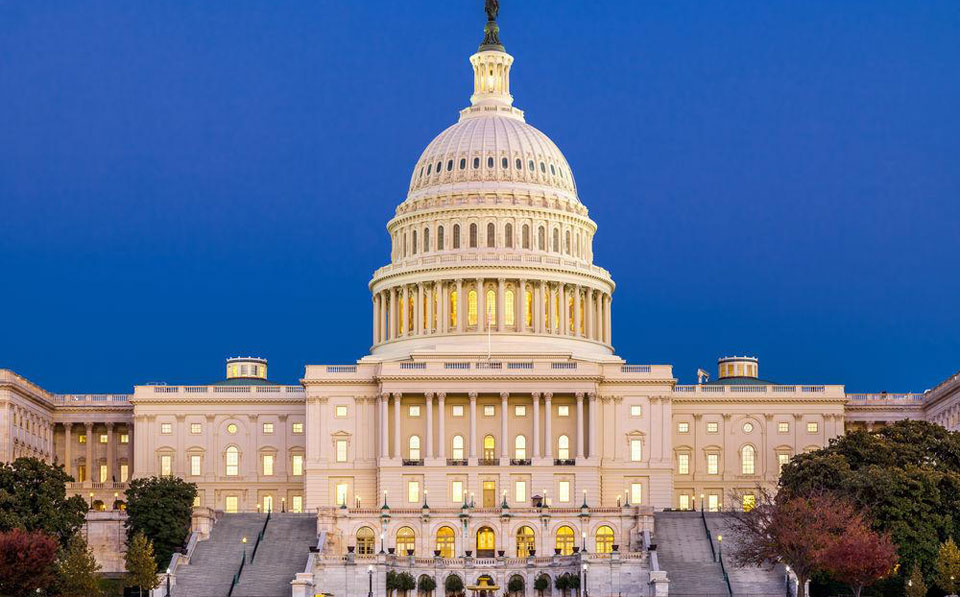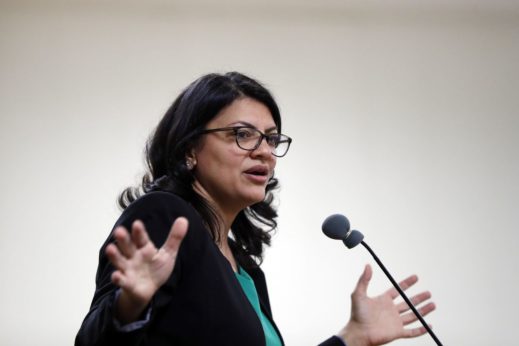
WASHINGTON—With the 116th Congress opening today, there seem to be four constants voters can expect in the next two years on Capitol Hill:
The Democratic-run House will pass progressive legislation which will sink from sight in the GOP-run Senate or fall victim to GOP President Donald Trump’s veto pen. The Senate’s bills will cater to the corporate class, but those measures will sink from sight in the House.
There will be investigations. Lots of investigations. And, oh yes, a throng of lawmakers – Sen. Elizabeth Warren, D-Mass., is the first, but not the last – will spend their time running for president.
But before all that gets started, House Democrats will battle against Trump over reopening the third of the government he’s locked out. Anti-lockout bills were legislative items #1 and #2 after lawmakers elected Rep. Nancy Pelosi, D-Calif., as Speaker and then set up rules for running the House.
“The partisanship, rancor, and dysfunction of the Trump shutdown are exactly what voters rebuked in November,” freshman Rep. Joe Neguse, D-Colo., said in the Democrats’ weekly radio address just before New Year’s Day. “That is why on January 3rd, when the new Democratic House majority arrives, we will bring the hope, vision, and goals of effective governance back to the forefront.”
While Neguse in his remarks and Democratic leaders generally are striking a cautious note when it comes to the issue of impeachment some in the new Congress see it as central to the battle for social and economic justice.
Prominent among those is newly-elected Michigan Democratic representative, Rashida Tlaib, who called today for immediate moves in Congress aimed at impeachment of President Trump.
“Each passing day brings more pain for the people most directly hurt by this president,” she said. In an article written for her hometown newspaper published today she tied her oath of office (which calls for defending “the Constitution of the U.S. against all enemies, foreign and domestic”) to her action for impeachment. “The time to impeach President Trump is now,” she declared, discounting arguments for waiting for the results of the Mueller investigation.
She said the president’s “lawlessness” has caused real damage to many people. “Those most vulnerable to his cruelty are counting on us to act – act to remove the president and put this country on a path to true justice.”
“Every day this pointless shutdown drags on, hundreds of thousands of working people are denied a paycheck and millions lose the vital government services that we deserve,” AFL-CIO President Richard Trumka said. Workers look to “congressional leaders to bring an end to this debacle. When the House of Representatives passes legislation tomorrow to reopen the federal government — bills the Senate already passed — the Senate leadership should immediately follow suit and the president should sign it.
“While President Trump continues to hold the government shutdown and public service workers as pawns for his ‘wall,’ Democrats’ first act of the new year, and their new House majority is a much-needed solution to reopen our government,” added Teachers (AFT) President Randi Weingarten.
“The American people need a fully functioning, fully operational government,” she declared. Those two bills are identical to ones both parties and both chambers agreed to in December — before Trump catered to his base and killed them.
“People who live paycheck to paycheck do not know when or if they will be able to afford their rent, food, and medicine. It’s time to end the Trump shutdown and the pain it is inflicting on our families,” Weingarten added.
But first the new House Democratic majority will change the rules, and that’s important: The House’s rules govern what lawmakers can consider – or not – for the next two years. For example, the GOP had a rule that tax increases needed a 60 percent supermajority to pass. Pelosi originally wanted to keep that standard for any tax hike affecting the bottom 80 percent of taxpayers.
Powered by female, minority, progressive and Democratic first-timers, the new Democratic-run House, including 110 women, achieved one win before Congress even began: They dumped that GOP tax rule. The progressives, who now have the largest caucus in the House, said “no,” loudly. A 60 percent majority, they said, would scotch various initiatives, including repeal of Trump’s tax cut. They won.
“By a historic 10-million vote margin, the American people went to the polls and asked for a professionally run Congress that would be more transparent, ethical and committed to debating and advancing good ideas no matter where they come from,” Pelosi proclaimed in December. “Our rules package will deliver that Congress, ushering in a new era of clean government that will honor the consensus of the American people – restoring the People’s House to the people.”
The progressives’ second win, at least in the House, will be on funding the government again, because the same group has made it quite clear Democrats and their allies must not yield to Trump’s demand for $5 billion for his Mexican Wall. So did Pelosi when she met Trump on Jan. 2. “How many times must we say ‘no’?” she asked.
But that’s where the Senate gets into the act. The result, on funding the government, paying for Trump’s Mexican Wall, and on issues coming down the pike — from climate change to paid family leave — may be the same: GOP-caused gridlock, from either the larger Senate GOP majority, Trump vetoes, or both
The reason? Senate Majority Leader Mitch McConnell, R-Kent., pledged not to pass anything Trump won’t sign – starting with money bills for the federal agencies – and he has the votes to enforce it.
The GOP now has 53 of the 100 senators, up from 51 in the last Congress. McConnell can afford to lose the votes of occasional renegades Lisa Murkowski of Alaska and Susan Collins of Maine, and even Utah’s Mitt Romney. He’ll still have 50 GOP votes without them, plus GOP Vice President Mike Pence to break ties. That includes votes on putting right-wing ideologues into federal judges’ robes.
Trump nominated, and the departed Senate confirmed, 84 federal judges, including 29 appeals court jurists and right-wingers Neil Gorsuch and Brett Kavanaugh to the U.S. Supreme Court. McConnell needs a simple majority for judges. He told Reuters judges will be a top priority this Congress.
Once the House passes the funding bills, Pelosi signaled a top priority: HR1 will be a legislative package to restore and strengthen voting rights, curb the impact of hidden corporate dark money on politics and lessen the influence of lobbies.
It will also try to end the “revolving door” between Congress – including staffers – and lobbies, mandate automatic voter registration by the states, and attempt to reverse GOP state-level legislation that bars women, minorities, workers, students, LGBTQ people, and others from voting.
HR1 will be followed by a revived House special committee on climate change – a key demand of the progressives – paid family and medical leave, creating Green Jobs programs and changing the rules to provide greater protection to the Affordable Care Act, among other agenda items.
The Democratic-run House will also vote next week to defend the ACA in the GOP attorneys’ general lawsuit overturning the Obama-era health care law. Later, Dems plan to raise the minimum wage to $15 an hour and to enhance worker rights by a much stronger version of the Employee Free Choice Act.
Plus, Rep. Barbara Lee, D-Calif., who recently maneuvered around Trump’s Muslim ban so a Yemeni mother could fly to the U.S. to be at the bedside of her comatose, U.S.-born 2-year-old son before he died, plans to push for ending such discrimination, and for comprehensive immigration reform.
That’s for starters.
But all those initiatives, with the possible exception of paid family leave, may sink from sight in the Senate. For example, Senate Minority Leader Charles Schumer, D-N.Y., wrote McConnell in December saying any infrastructure package – a goal both parties say they want to enact and that organized labor strongly supports – should include climate control measures.
McConnell, who represents coal state Kentucky, and his ruling Republicans, led by Trump, deny the climate change problem even exists. They want to increase burning of fossil fuels, which cause the carbon emissions that lead to global warming. Trump’s EPA proposed rules to do so before Trump shut the agency down.

That leaves investigations, and not just Special Counsel Robert Mueller’s probe of Russian interference to throw the 2016 presidential election to the then-GOP nominee, with or without Trump’s collusion.
Reports show at least half a dozen more potential probes of Trump, his officials and their corruption:
- Trump Interior Secretary Ryan Zinke may have quit under pressure of 15 investigations of his ethics by his own agency and the Justice Department, but they won’t stop. Neither will House Natural Resources Committee Chairman Raul Grijalva, D-Ariz. He plans to quiz Zinke on shady self-dealing.
- House Education and Labor Committee Chairman Bobby Scott, D-Va. — one of five African-Americans who will chair panels in the new Democratic-run House –- plans extensive oversight hearings on actions of Trump Education Secretary Elizabeth “Betsy” DeVos. Among the targets: DeVos’s rollback of college protections for women and LGBTQ students against sexual harassment and assault, and her “free pass” to crooked for-profit “colleges,” sticking ex-students with the bills.
- Rep. Jerrold Nadler, D-N.Y., has battled Trump for 30 years, starting when then-state assemblyman Nadler battled Manhattan mogul Trump over projects. Now Nadler sits where fabled New Jersey Democrat Peter Rodino sat in 1974: Chair of the House Judiciary Committee. It handles impeachment.
“You don’t necessarily launch an impeachment against the president because he committed an impeachable offense,” Nadler told CNN. “There are several things you have to look at.” They include the quality of the evidence. On the other hand, Nadler noted, Trump’s payoffs to women through then-attorney Michael Cohen – to keep silent during the campaign “is an impeachable offense.”
Judiciary also handles another Trump hot-button issue: Immigration reform. And it has oversight over the Justice Department, which becomes important if Trump fires Mueller.
- Several incoming committee chairs – Reps. Maxine Waters (Banking) and Adam Schiff (Select Committee on Intelligence), both D-Calif., and Richard Neal, D-Mass. (Ways and Means) – will have the power to investigate Trump’s financial deals with the Russians over his proposed Trump Moscow hotel, his tax returns, his relations with Putin’s government and its election sabotage, or all of those. Waters and Schiff are targets of Trump tweet tirades. All three are being cautious about their plans.
So is Rep. Elijah Cummings, D-Md., chair of the Oversight and Government Reform Committee, which has the widest-ranging investigative charter in the House. He says he’s not going to launch probes just for the sake of headlines. But Cummings notes he’s sent 51 information requests to Trump officials the last two years and gotten stonewalled on every one. That gives him a fertile field for probing. He’s already re-sent all the letters and asked for replies by Jan. 11.













Comments